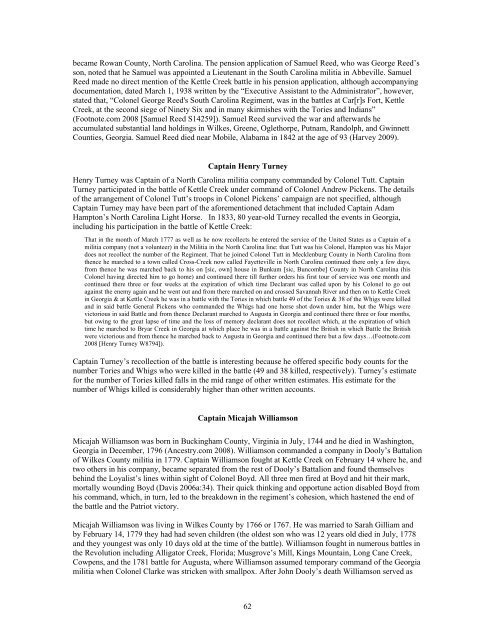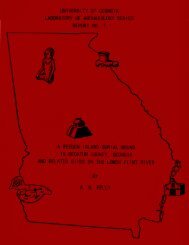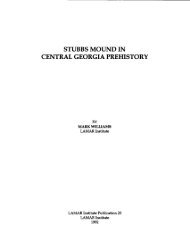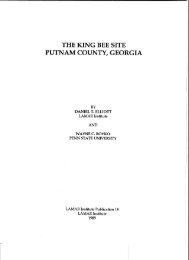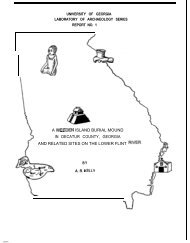Stirring Up a Hornet's Nest: - UGA Laboratory of Archaeology ...
Stirring Up a Hornet's Nest: - UGA Laboratory of Archaeology ...
Stirring Up a Hornet's Nest: - UGA Laboratory of Archaeology ...
You also want an ePaper? Increase the reach of your titles
YUMPU automatically turns print PDFs into web optimized ePapers that Google loves.
ecame Rowan County, North Carolina. The pension application <strong>of</strong> Samuel Reed, who was George Reed’s<br />
son, noted that he Samuel was appointed a Lieutenant in the South Carolina militia in Abbeville. Samuel<br />
Reed made no direct mention <strong>of</strong> the Kettle Creek battle in his pension application, although accompanying<br />
documentation, dated March 1, 1938 written by the “Executive Assistant to the Administrator”, however,<br />
stated that, “Colonel George Reed's South Carolina Regiment, was in the battles at Car[r]s Fort, Kettle<br />
Creek, at the second siege <strong>of</strong> Ninety Six and in many skirmishes with the Tories and Indians”<br />
(Footnote.com 2008 [Samuel Reed S14259]). Samuel Reed survived the war and afterwards he<br />
accumulated substantial land holdings in Wilkes, Greene, Oglethorpe, Putnam, Randolph, and Gwinnett<br />
Counties, Georgia. Samuel Reed died near Mobile, Alabama in 1842 at the age <strong>of</strong> 93 (Harvey 2009).<br />
BCaptain Henry Turney<br />
Henry Turney was Captain <strong>of</strong> a North Carolina militia company commanded by Colonel Tutt. Captain<br />
Turney participated in the battle <strong>of</strong> Kettle Creek under command <strong>of</strong> Colonel Andrew Pickens. The details<br />
<strong>of</strong> the arrangement <strong>of</strong> Colonel Tutt’s troops in Colonel Pickens’ campaign are not specified, although<br />
Captain Turney may have been part <strong>of</strong> the aforementioned detachment that included Captain Adam<br />
Hampton’s North Carolina Light Horse. In 1833, 80 year-old Turney recalled the events in Georgia,<br />
including his participation in the battle <strong>of</strong> Kettle Creek:<br />
That in the month <strong>of</strong> March 1777 as well as he now recollects he entered the service <strong>of</strong> the United States as a Captain <strong>of</strong> a<br />
militia company (not a volunteer) in the Militia in the North Carolina line: that Tutt was his Colonel, Hampton was his Major<br />
does not recollect the number <strong>of</strong> the Regiment. That he joined Colonel Tutt in Mecklenburg County in North Carolina from<br />
thence he marched to a town called Cross-Creek now called Fayetteville in North Carolina continued there only a few days,<br />
from thence he was marched back to his on [sic, own] house in Bunkum [sic, Buncombe] County in North Carolina (his<br />
Colonel having directed him to go home) and continued there till further orders his first tour <strong>of</strong> service was one month and<br />
continued there three or four weeks at the expiration <strong>of</strong> which time Declarant was called upon by his Colonel to go out<br />
against the enemy again and he went out and from there marched on and crossed Savannah River and then on to Kettle Creek<br />
in Georgia & at Kettle Creek he was in a battle with the Tories in which battle 49 <strong>of</strong> the Tories & 38 <strong>of</strong> the Whigs were killed<br />
and in said battle General Pickens who commanded the Whigs had one horse shot down under him, but the Whigs were<br />
victorious in said Battle and from thence Declarant marched to Augusta in Georgia and continued there three or four months,<br />
but owing to the great lapse <strong>of</strong> time and the loss <strong>of</strong> memory declarant does not recollect which, at the expiration <strong>of</strong> which<br />
time he marched to Bryar Creek in Georgia at which place he was in a battle against the British in which Battle the British<br />
were victorious and from thence he marched back to Augusta in Georgia and continued there but a few days…(Footnote.com<br />
2008 [Henry Turney W8794]).<br />
Captain Turney’s recollection <strong>of</strong> the battle is interesting because he <strong>of</strong>fered specific body counts for the<br />
number Tories and Whigs who were killed in the battle (49 and 38 killed, respectively). Turney’s estimate<br />
for the number <strong>of</strong> Tories killed falls in the mid range <strong>of</strong> other written estimates. His estimate for the<br />
number <strong>of</strong> Whigs killed is considerably higher than other written accounts.<br />
BCaptain Micajah Williamson<br />
Micajah Williamson was born in Buckingham County, Virginia in July, 1744 and he died in Washington,<br />
Georgia in December, 1796 (Ancestry.com 2008). Williamson commanded a company in Dooly’s Battalion<br />
<strong>of</strong> Wilkes County militia in 1779. Captain Williamson fought at Kettle Creek on February 14 where he, and<br />
two others in his company, became separated from the rest <strong>of</strong> Dooly’s Battalion and found themselves<br />
behind the Loyalist’s lines within sight <strong>of</strong> Colonel Boyd. All three men fired at Boyd and hit their mark,<br />
mortally wounding Boyd (Davis 2006a:34). Their quick thinking and opportune action disabled Boyd from<br />
his command, which, in turn, led to the breakdown in the regiment’s cohesion, which hastened the end <strong>of</strong><br />
the battle and the Patriot victory.<br />
Micajah Williamson was living in Wilkes County by 1766 or 1767. He was married to Sarah Gilliam and<br />
by February 14, 1779 they had had seven children (the oldest son who was 12 years old died in July, 1778<br />
and they youngest was only 10 days old at the time <strong>of</strong> the battle). Williamson fought in numerous battles in<br />
the Revolution including Alligator Creek, Florida; Musgrove’s Mill, Kings Mountain, Long Cane Creek,<br />
Cowpens, and the 1781 battle for Augusta, where Williamson assumed temporary command <strong>of</strong> the Georgia<br />
militia when Colonel Clarke was stricken with smallpox. After John Dooly’s death Williamson served as<br />
62


